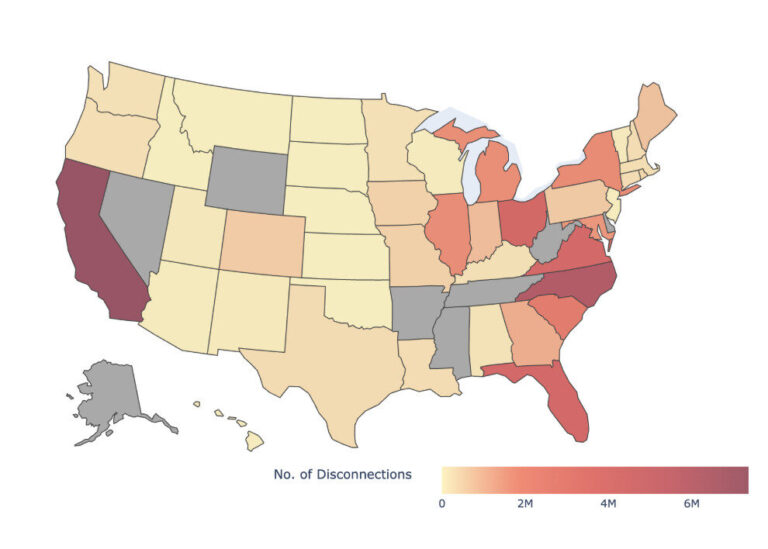Utilities that support Inflation Reduction Act are members of trade groups attacking it

Electric utilities whose executives have said that Senate Democrats’ spending package to address climate change would be good for both their customers and their shareholders are also members of trade associations working to kill the legislation.
The Inflation Reduction Act (IRA), a legislative deal announced by Sen. Chuck Schumer and Sen. Joe Manchin on July 27, would spend $369 million on clean energy measures, including wind, solar, battery storage and electric vehicles.
The IRA is coming under a furious 11th-hour attack by corporations who oppose a key provision: a 15% minimum corporate book-tax that would close loopholes that currently allow some large companies to pay little to no taxes. Revenue from the minimum tax will pay for the bill’s investments to drive down the cost of clean energy, health insurance, and drug prices.
The U.S. Chamber of Commerce and National Association of Manufacturers (NAM) are leading the attacks, which are designed to peel away the support of Arizona Sen. Kristen Sinema, the remaining lynchpin to the Democrats’ effort to pass a party-line bill. The Arizona Chamber of Commerce and Industry has joined the national groups in backing an avalanche of ads attacking the bill in that state.
Axios reported that NAM and the Arizona Chamber “have launched a six-figure digital and TV ad buy — compressed into one week — to saturate the Phoenix and Tucson media markets.”
Several utility companies who have expressed support for the bill, even specifically telling shareholders that the 15% minimum tax will not pose a threat to their profits, are members of the industry associations attacking the bill.
APS says IRA is good for it and customers, while the Chamber in which it’s a key stakeholder attacks it
The CEO of Arizona Public Service (APS), Jeff Guldner, said on an earnings call yesterday that the legislation would be broadly good for APS and its customers.
“I think we view generally the IRA process is being helpful from a customer affordability perspective because it would really help reduce the cost for us to continue to move ahead with the deployment of the clean technology and take advantage of some of the tax — different tax credits,” Guldner said on the call.
Responding to a question from an analyst about whether the bill’s proposed Alternative Minimum Tax of 15% would be a problem for APS, Guldner said explicitly that it would not.
But the Arizona Chamber of Commerce and Industry is campaigning hard for Sinema to kill the bill with an opposite message, jointly taking out full-page newspaper ads with the U.S. Chamber in Arizona that argues to Sinema that the bill’s tax increases would harm clean energy investment.
The IRA “really hits Arizona businesses hard,” Danny Seiden, president and CEO of the Arizona Chamber of Commerce, said to Axios.
APS is a key stakeholder in the Arizona Chamber, one of only three “Champion Level” members, along with Salt River Project, another utility, and Cox Communications. SRP has said it supports the clean energy measures in the legislation.
Robert Smith, the Executive Vice President, General Counsel and Chief Development Officer for APS’ parent company, Pinnacle West Capital, sits on the board of NAM, though the company does not list NAM as a trade association on its political participation disclosure to investors.
U.S. Chamber members include utilities who say they would benefit from IRA
Several investor-owned utilities who have praised the bill are also members of the U.S. Chamber of Commerce, which has long opposed climate action, including spending to try to sink earlier incarnations of the Inflation Reduction Act.
According to their disclosures of political affiliations to shareholders, utility members in the U.S. Chamber include American Electric Power (AEP), DTE Energy, Duke Energy, Exelon, NextEra Energy and Southern Company. AEP, DTE Energy and Southern Company are also members of NAM, according to the disclosures.
Several of those utilities have had earnings calls since the IRA was announced, and their executives have mostly told investors in recent earnings calls two things: first, that the IRA would be good for it and its customers, and second that the alternative minimum tax provision would not harm the companies financially.
“This looks really good,” Southern CEO Tom Fanning said on July 28. “If I had to write a headline on all of those benefits, I would say that this is really beneficial to our customers and should reduce the cost of the transition from the fleet today to the net-zero long-term strategy in the future,” Fanning said of the bill.
“So what about the negatives? What about the pay-fors? If you look at kind of the list of that, leading the charts is this 15% corporate minimum book tax … A company as big as ours with $23 billion of revenue and all that other stuff, the difference is in taxes paid is just really small like 0.5% kind of as an estimate. It’s almost you can’t see it, $5 million, $10 million. It’s almost nothing. Now of course, as that travels over time depends on a host of factors. But to us, this alternative book tax just doesn’t have a material impact to the company, okay?”
Chris Womack, the President of Georgia Power, a Southern Co. subsidiary, sits on the U.S. Chamber’s board. Chris Womack, the President of Georgia Power, a Southern Co. subsidiary, sits on the U.S. Chamber’s board. Stan Connally, EVP of Southern Co. for Operations and President & CEO of Southern Company Services, sits on the NAM board.
The CEO of DTE Energy, which is a member of both the U.S. Chamber and NAM, spoke to investors on July 28 just after the IRA text was made public, and called it “a good surprise.”
“We’re not counting on any of this right now in our plan, but we think that there’s some good benefits and some good impacts to clean energy going forward,” DTE President and CEO Jerry Norcia said.
Asked specifically about the minimum tax, DTE’s CFO minimized the impact: “It may have a little bit of a cash hit, but it wasn’t that strong.”
Duke Energy’s Chairman, President and CEO Lynn Good said in an earnings call on August 4 that “If passed, the clean energy tax credits will lower our cost of service, which in turn reduces the cost to customers of our energy transition … We’re pleased to see the strong support of the clean energy provisions in this draft legislation, and we look forward to tracking the bill’s progress, and we’ll keep you informed along the way.”
Good hedged when asked about the minimum tax, but implied that any negative effects to Duke might be offset by the increased tax credits in the bill: ” We will be impacted by the corporate minimum tax, but we will also benefit from the credits, which we will pass through our customers,” she said.
AEP and NextEra Energy have not had an earnings call since the bill resuscitated in late July, but NextEra had been bullish on its earlier variations, with the company’s CEO telling analysts on June 14th that “the business would benefit most if we were able to get tax reform” due to NextEra’s large renewable energy investments.
The only utility to express significant concerns about the minimum tax was Exelon, whose executives praised the bill’s energy spending, but decried the corporate minimum tax, with President and CEO Chris Crane saying on an earnings call this morning that “With this language currently proposed, we and other utilities could face an increase in cash tax.”
Melissa A. Lavinson, Exelon’s Senior VP of Federal Government, Regulatory Affairs & Public Policy said that “we continue to talk with the senators about potentially unintended consequences of how the minimum tax might be applied and its impact on our ability to continue the robust investments that we’re making.”
Later in the call, Exelon’s CFO said that the tax change, if it happens, wouldn’t change Exelon’s commitment to investors of 6 – 8% earnings growth annually.
Investors have expressed concerns about utilities’ trade association misalignment on climate
Large institutional investors have increasingly been asking utilities to align their political advocacy – specifically including their memberships in trade associations like the U.S. Chamber of Commerce – with their climate goals.
An assessment released last year by the Climate Action 100+ investor coalition found that electric utilities were failing to align their political advocacy with the goals of the Paris climate agreement or with their investors’ expectations.
The benchmark specifically assessed utilities’ trade association memberships. All U.S. investor-owned utilities failed to meet the criteria for the Climate Action 100+ investors’ assessment of their climate policy engagement, which considers whether a company’s trade associations support policies that would help meet the Paris Agreement goals.
| Utility | U.S. Chamber annual dues | Lobbying share of U.S. Chamber membership | NAM annual dues | Lobbying share of NAM dues |
| AEP | Does not disclose amount* | $100,000 | Does not disclose amount** | $17,502 |
| DTE Energy | $100,000 | $25,000 | $58,620 | $11,724 |
| Duke Energy | Does not disclose amount* | $62,500 | – | – |
| Exelon | $350,000 | $87,500 | – | – |
| NextEra Energy | Does not disclose amount. | Does not disclose amount. | – | – |
| Southern Co. | Does not disclose amount* | $337,500 | Does not disclose amount** | $91,309 |
*AEP, Duke Energy and Southern Co. disclosed only the dues to the U.S. Chamber that they said were the share used for non-deductible lobbying. Both DTE and Exelon, which disclosed their full dues as well as the lobbying share, listed the lobbying share for the Chamber as 25%.
**AEP and Southern co. disclosed only the dues to NAM that they said were the share used for non-deductible lobbying. DTE listed its lobbying share to NAM as 20% of its dues, disclosing both numbers.
Updated August 4 with comments from Duke Energy’s earnings call and SRP’s position on the IRA.



